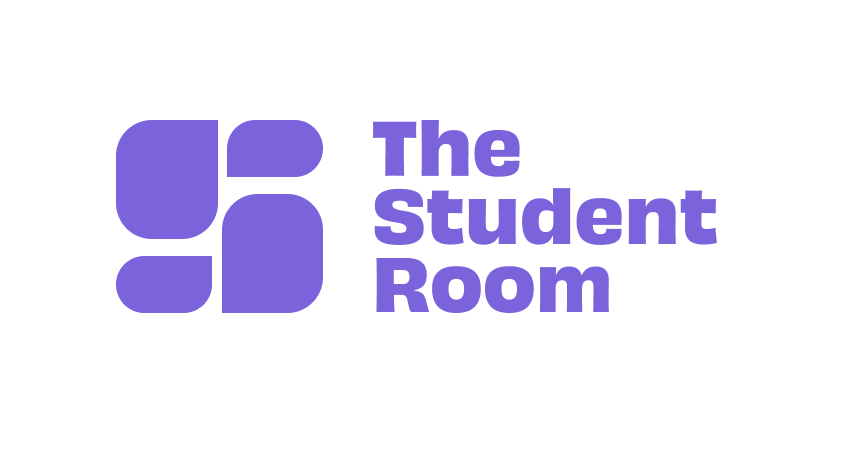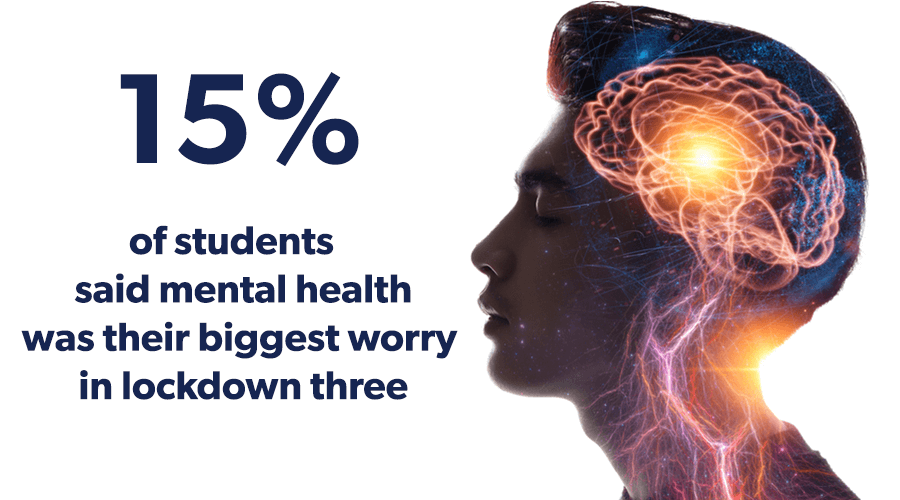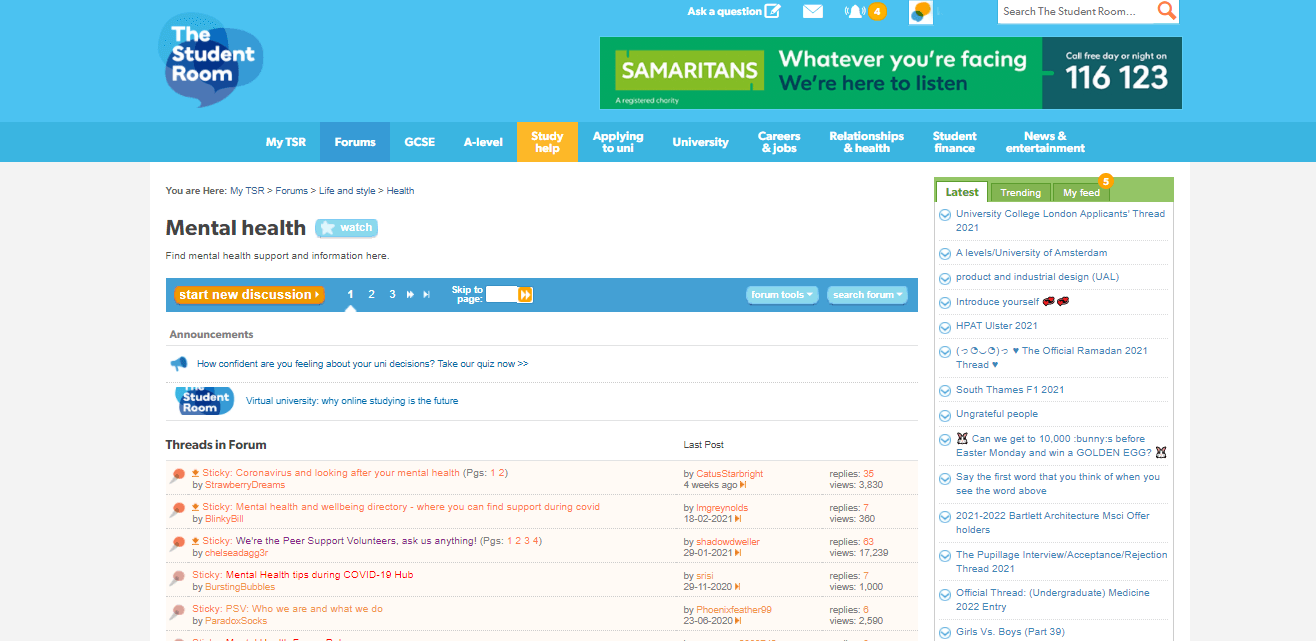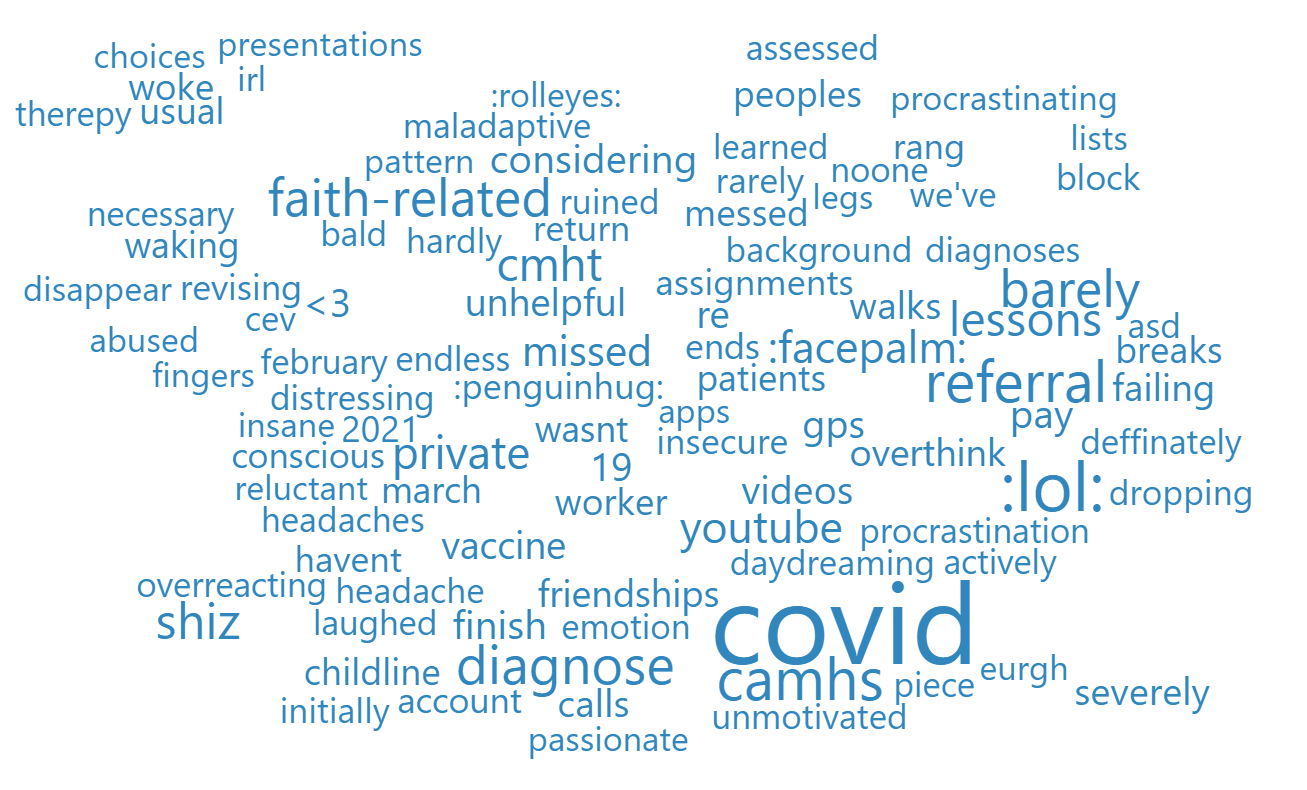The Student Room is working with Samaritans, Student Minds and Papyrus to improve mental health signposting for students on our platform.
The need for mental health services has risen sharply in recent years, and this has been exacerbated by the global pandemic. In recent research from HEPI, two-thirds (63%) of students said their mental health was worse as a result of covid-19.1
This collaborative project is a vital step we are taking to protect our youth community in challenging times:
“Every day on The Student Room we see students coming together to talk about the challenges they face. What’s clear is that the impact on mental health is keenly felt, and young people are in need of support now more than ever. We’ve had wonderful relationships with Papyrus, Student Minds and Samaritans for many years, and we’re thrilled to be supporting them and students by further embedding their important work in our community.”
Mhairi Underwood, Head of Student Voice and Diversity at The Student Room
Student Minds is the UK’s student mental health charity, while Samaritans and Papyrus support people who are at risk of suicide – sadly this is the biggest killer of under 35s in the UK.
The Student Room polls, January 2021
How we are working together
We are supporting these very worthwhile causes with a site-wide awareness campaign.
The Student Room will prominently feature adverts for each of the charities across our site between 8pm and 4am – a window when students may be feeling especially isolated.
The adverts will direct users to helplines where they can immediately get support when they need it.
We are also blocking all other advertising from our mental health forum and running the ads 24/7 to maximise the impact of this student wellbeing campaign.
“The roadblock has been set up in such a way that all mental health threads, however long, will feature either Samaritans, Student Minds or Papyrus ad units – reflective of the times each of the charities are open. This brings much-needed direct access to support when young people need it the most, and we’re proud to take a very solid stance that the mental health of young people is one of our main priorities.”
Hulda Fridriksdottir, Client Services Manager at The Student Room
Sara Andersson, Corporate Communications Manager at Samaritans said:
“There’s no doubt that these uncertain and challenging times are having an impact on our mental health and wellbeing, which is why it’s so important that we continue to check in on one another and share how we are feeling. Talking can be life-saving, whether it’s with a friend, family member or a confidential helpline like Samaritans.
We’re grateful to The Student Room for helping to raise awareness of our services, as Samaritans volunteers are always there to listen and they won’t judge or tell you what to do. Call for free on 116 123, email jo@samaritans.org or visit www.samaritans.org for more information and resources.”
Samaritans has also provided this useful link to: Tips for talking about suicide safely online.
Demand for mental health services is still growing
Mental health, once a taboo subject, is now frequently discussed in the media, at work and in the education sector.
Research by The Prince’s Trust found that, since the start of the pandemic, more than half of young people (16-25) feel anxious most or all of the time and 26% feel ‘unable to cope with life’.
The government announcement of the £500m Mental Health Recovery Action Plan in March was an essential step towards improving mental health support for young people.
It is hoped this will start to plug gaps in provision, including increasing mental health support teams in schools and putting £13m towards mental health support services tailored for young adults who fall between the child and adult categories (18-25).
Mhairi Underwood, Head of Student Voice and Diversity at The Student Room, shares why it’s so important to support this age group:
“In September, 77% of students on The Student Room said they didn’t feel confident they’d be able to access mental health support should they need it during the pandemic. We see young people asking for help identifying whether what they’re feeling is normal, and we see them struggling to negotiate the void between reaching out for help and getting to the top of the waitlist for an appointment. These are all circumstances where peer support can be invaluable, but it should also be complimented by clear signposting to expert organisations so in the very moment a young person is having these important conversations, they can also easily access further support and advice from these trusted helplines.”
At The Student Room, we have long-standing relationships with a number of mental health organisations, including PAPYRUS Prevention of Young Suicide.
Emma Fairhurst (she/her), HOPELINEUK Manager for PAPYRUS comments:
‘PAPYRUS supports people aged 35 and under who may be experiencing thoughts of suicide themselves or be concerned about someone else. We teamed up with The Student Room in 2019 in order to support students together. COVID19 has impacted students in many different ways – there has been a lot of loss, including loss of education, loss of freedom, loss of structure and loss of socialisation to name but a few. Working together with The Student Room has meant that students can learn about the work that PAPYRUS does and ensure they are getting the support they need and deserve through this difficult time.’
Mental health insights from The Student Room
The impact of the pandemic is very apparent from onsite activity across The Student Room platform. These are just a few examples:
- Live 2021 mental health poll is suggesting that uncertainty about their education is students’ top concern (+2000 responses)
- 10% increase in posts in our Mental health forum since lockdown 12
- 612 people supported by our Peer Support Volunteer team in relation to posts about suicide (with intent)3
- Over 11,000 posts about anxiety, worry or stress during the third lockdown4
This word cloud shows some of the most common words appearing in mental health posts:
Dates: 1 Jan – 18 Apr 2021
We can see plenty of these are directly related to the pandemic e.g covid, diagnose, vaccine, while others point to challenges in lockdown e.g. procrastination/ing, irl (in real life), lessons, missed, unmotivated
To get a clearer picture of what students are talking about, we’ve taken a look at some of the common themes.
Lacking motivation and worrying about assessments:
“I’m really stressed about my A level grades.”
“I’ve got exams in 2 weeks. But I genuinely cannot find the strength to revise. I can’t do it anymore, I know i’m gonna regret not studying but i literally can’t do it. It’s too much and too overwhelming”
“I feel like if the government were a little clearer with a level plans I’d be less stressed. I’ve developed an eating disorder and my depression and anxiety has gotten worse.”
Uni applications:
“I applied for Law in Mid-October, and have not heard anything…Nothing at all, no communication whatsoever. Is there anything I can do??”
“Anyone still waiting for PPE? why are they taking so long??“
“I still haven’t heard anything from…Uni for social anthropology and archeology and I am starting to get very nervous now about it.”
Mental illnesses and getting support:
“I am currently/have been on the waiting list for camhs since last year September but I feel my mental health getting worse…I badly need a fresh start ” (Posted 18 April 2021)
” (Posted 18 April 2021)
“i’m struggling”
The Student Room’s research into harm on social media
In 2019, The Student Room surveyed over 3,000 community members about the risks of using social media.5
Based on their other responses, the risks young people are facing online are very serious:
- 59% had witnessed self-harm content
- 51% had been a target of cyber-bullying (often someone known to the victim)
- 33% had received a nude photo before they were 16 (and 31% were asked to send one)
The survey also found that 79% of respondents said they thought tech companies needed to do more to self-regulate to protect young people who use social media.
Preparing for the Online Safety Bill, expected in 2021
Since April 2019 (and the publication of the online harms government white paper) online businesses like The Student Room have been preparing for a new regulatory framework.
User wellbeing has always been a key priority for our business. Now that the consultation is complete, and a draft of the Online Safety Bill expected to be presented in Parliament in the coming months, we will continue to apply and evaluate best practice approaches.
When the Online Safety Bill is passed, we will build on our existing tools and policies to keep users safe on our site, taking all possible steps to incorporate and adhere to the duty of care guidelines set by the independent regulator Ofcom.
For example, while we were already following Samaritans industry guidelines in relation to self-harm and suicide content, our new mental health signposting initiative will create a safer space for our users.
How The Student Room is already keeping users safe online
The Student Room attracts 10 million monthly users, and we have always taken our duty of care for that community seriously.
Here are just a few of the ways we make student safety a priority:
- A dedicated team of Community Managers, volunteers and moderators who monitor onsite activity to quickly identify and address situations where young people might be at risk of harm. They all receive safeguarding training every three years.
- DBS checks for all staff and volunteers at The Student Room
- Internal moderation policies, management systems, bespoke technologies and procedures (including for sensitive issues like suicide, self-harm, racism, gender equality and sexuality)
- Public community rules and guidelines
- Safeguarding measures and escalation processes (with external agencies as needed)
- Users are not able to send images via the private message service
- Member support forum ‘Ask the Community Staff’
- Peer Support Volunteers – to support users posting about suicide (with intent)
- Work with other organisations for training and advice e.g. Papyrus or Samaritans
- Consulting – sharing our expertise and experiences as the UK’s largest online student community, including the development of the Online Harms Bill
Our commitment to wellbeing is what allows us to form value-aligned partnerships with influential UK youth mental health charities like Student Minds:
“At Student Minds, the UK’s student mental health charity, we are delighted that The Student Room has provided us with the opportunity to share the support available to university students by sharing Student Space’s phoneline during the evenings, a time where people often reach out for help. We hope that we can work together to ensure students get the support they need during the pandemic and beyond.”
If you, or someone you know, needs support with mental health, you can contact these organisations:
Samaritans
For: everyone
Samaritans works to make sure there’s always someone there for anyone who needs someone.
Call the 24/7 helpline: 116 123
Papyrus
For: under 35s
The UK charity for the prevention of young suicide (under 35).
Call HopelineUK: 0800 068 41 41
Student Space, by Student Minds
For: students
The UK’s student mental health charity.
Call free (4pm – 11pm): 0808 189 5260
For more youth insights or information about student mental health, get in touch with our team:
0800 999 3222
hello@thestudentroom.com
Data sources
1 https://www.hepi.ac.uk/wp-content/uploads/2021/03/HEPI-Policy-Note-29-Students-views-on-the-impact-of-Coronavirus-on-their-higher-education-experience-in-2021-26_03_21.pdf
2 Google analytics, The Student Room, 29,289 posts between 23 Mar 2020 – 23 Mar 2021 (+10% YoY)
3 The Student Room, 1 Mar 2020 – 28 Feb 2021
4 The Student Room, 1 Nov 2020 – 28 Feb 2021
5 TSR Insight (part of The Student Room Group) research report “The impact of social media on young people”, February 2020, 3156 respondents
Author: Katie Hale







